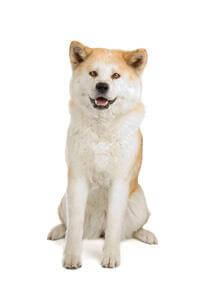Find products that match your dog’s needs

Originating from the 17th Century, Akitas were bred to be hunters. If you are someone who has been looking to house a large breed dog that protects you and your house, the Akita dog breed is the right pick for you. Akitas also serve as guard dogs and police dogs in Japan.
Akitas are intelligent and run high on energy. They love playing out in the open with their loved ones. If you plan on sheltering an Akita dog, make sure you have ample time to spend with them and take them out. Akitas are an amazing choice for caregivers who live alone or do not have any kids. Does that mean you cannot bring an Akita home if you have children? Absolutely not, all you need to do is train and socialise your floof! Once you get one of these beasts home, you can breathe easy because your protection is in the right hands, or should we say paws?
If you are looking to bring an Akita home, here are some things that you must keep in mind:
Weight | 31 to 59 kg |
Height | 24 to 28 inches |
Lifespan | 10 to 14 years |
Coat | Double coat |
Akitas are extremely cute and look like teddy bears! That being said, these dogs have two layers of luscious fur. Akitas can be found in different coat colours such as:
Brown
Silver
Fawn
Red
Black
White
You may easily find a red, brown, or fawn-coloured Akita but if you happen to find a black or sesame-coloured Akita dog, you are in luck! Black and sesame coloured Akita dogs are regarded as unique and special!
Trying to find out if the Akita dog in front of you is a purebred? Look out for these signs:
Small eyes
Erect years
Muscular body with straight legs
High, curly tail
An Akita’s personality revolves around its family. These dogs are very family-oriented and love to spend quality time with their loved ones. They enjoy mental and physical activities. So, if you find some doggy puzzles or feel like a walk, you can count on your Akita dog.
Although, the Akita dog breed is not big on socialising. Akita dogs feel cautious around strangers, and it is in their nature to be alert! However, they can benefit from some socialising and training during their puppyhood. You can always choose to get your Akita dog accustomed to other pets, children, and other members of your family. Since their protective instincts drive their behaviour, they might misinterpret any playful gestures as an attack. For this reason, Akita dogs should always be under supervision around kids.
Akita dogs were bred to be guards. They are known for their strong bites and will always protect their caregivers and family. This makes it important for any responsible pet parent to train their Akita and make sure it knows the difference between a foe and family.
Yes, Akita dogs must be trained from their puppyhood. Akitas are intelligent and smart, and they love physical activity. Train them with plenty of yummy treats and make sure they know what behaviour you want to see more of! Short training sessions are recommended for the Akita dog breed since they get distracted easily.
It is important to not use any kind of force with this large breed. Things could go sideways quickly. If training a large dog like the Akita turns out to be challenging for you, just appoint a certified dog trainer. Akita dogs can sometimes be extraordinarily strong and stubborn, and an experienced coach might be your safest option!
Akitas love it when they are socialised from an early age, they will turn into the happiest pups. You may need to care for them physically a little more during different seasons, but they tend to keep themselves clean! If you are wondering how you could help your Akita become its best self, here is what you need to pay attention to:
The Akita dog breed has a life expectancy of 10 to 14 years. To help them live a long and comfortable life, pet parents need to watch out for certain common health conditions like hip dysplasia, progressive retinal atrophy, gastric dilation and volvulus, immune disorders, sebaceous adenitis, and Von Willebrand disease. There are specific Akita breeders who screen Akitas for these diseases. If you are adopting an Akita from a shelter, the staff can provide you with information about such breeders.
Akitas are like cats when it comes to grooming, particularly about their appearance and hygiene. These cute doggos need to be brushed just once a week! Your Akita may face severe shedding as the seasons change and their undercoat will begin to shed 10 times faster than usual. This is natural and all you need to do is make sure that you brush your Akita once a day during shedding season with a comb (preferably a pine comb) that can penetrate the undercoat!
Bathing Akitas once a month is more than enough unless they’ve been in mud and dirt. Every time you bathe it, give its nails a trim! Brushing your Akita dog’s teeth every day is crucial to avoid any sort of build-up. Pet parents must start brushing their Akita’s teeth from puppyhood so that they are aware of the feeling. Since these are large-sized dogs, a vet can help you with grooming techniques!
Akita dogs crave movement and exercise. Two to three short walks or a 30-minute long walk each day is highly recommended. They love the outdoors and taking them outside will instantly cheer them up and put them in a good mood! If you are planning a trek or a hike any time soon, count your furry Akita in!
Akita dogs love commercial food and if you want to pick up a quick bite for your Akita, just choose a formula that is recommended for its age and activity levels. However, do not let your Akita eat right after exercising or too fast. Akita dogs are prone to GDV (gastric dilation and volvulus), a condition where their stomach twists itself because of excessive gas. Feed them slowly and make sure that your dog is eating at least an hour or two after exercising. Ask your vet for ideal meal plans and avoid any unwanted surprises.
The name “Akita” almost sounds like the title of an interesting, yet mysterious action movie. And the story of its origin live up to it. Akitas hail from the 17th Century, bred in Japan to hunt bears, deer, and boars. Post World War II, the Akita dog breed came very close to extinction as only 50 of the kind walked on Earth. Somehow, a group of people took the initiative to preserve this breed and emerged successful. Today, Akitas are common in Japan, live in households all over the globe, and serve as police dogs in Japan!
Akitas can get along with other pets provided they are trained and socialised from a young age. Akitas are protective in nature and may not take well to other pets unless they’ve been socialised regularly.
An Akita is the ideal family dog. Once an Akita regards you as its family, it will do everything in its power to protect you. Akita dogs also love playing with their loved ones so if you are looking for some fun family time, your floof will take charge.
It is best to not leave Akitas at home. They crave movement and exercise and leaving them at home too long could lead to disruptive behaviour.
Akitas have been compared to cats when it comes to grooming. They love grooming themselves which makes grooming easy for pet parents!
Akita dogs do not bark much. Akitas are known as “Silent Hunters”. They were bred to be hunting dogs and good hunters never do anything to alert their prey!

Find a PEDIGREE® stockist
near you!
Buy online
Click to buy from any of the retailers below

